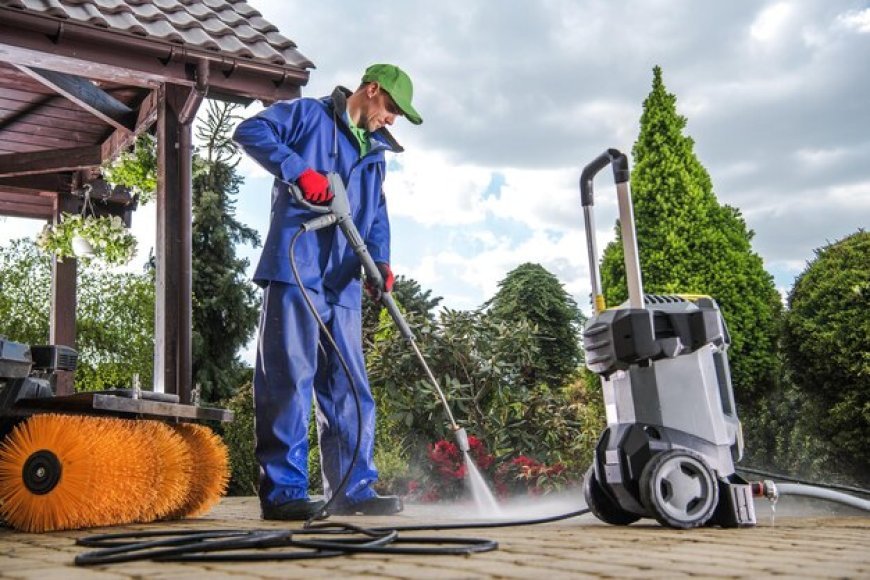How to Choose the Right Tool for Industrial Cleaning

Keeping industrial spaces clean isn’t just about looks. It’s about safety, efficiency, and making sure everything runs smoothly. But not every tool works for every job. Picking the right one makes a huge difference. The right machine saves time, cuts costs, and gets the job done right.
Why Equipment Matters More Than You Think

A commercial pressure washer is one of the go-to tools for industrial cleaning. It’s powerful, built for tough jobs, and way stronger than the ones used at home. These machines blast away grime, oil, and stubborn dirt. But here’s the kicker—the pressure washer nozzle is just as important. It controls the spray power and direction. Choose the wrong one, and you might waste water, damage surfaces, or just not clean properly. According to the Cleaning Equipment Trade Association (CETA), the right nozzle can boost cleaning efficiency by 40%.
Different Types of Pressure Washers
Not all pressure washers are the same. Each type works best in different situations. Knowing the difference helps you pick the right one.
Cold Water Pressure Washers
Great for washing away dirt and dust. These are common in outdoor spaces, parking lots, and general maintenance. They’re cheaper, easy to use, and don’t need much upkeep.
Hot Water Pressure Washers
Perfect for greasy, oily messes. If you’re cleaning industrial kitchens, garages, or food-processing plants, hot water is a game-changer. It cuts through grease faster and reduces the need for strong detergents.
Steam Pressure Washers
Used in industries where sanitization is a must. Think hospitals, food processing, or pharmaceutical plants. Steam pressure washers kill bacteria and deep clean without needing tons of chemicals.
What to Look for in a Commercial Pressure Washer
Pressure and Water Flow
PSI (pounds per square inch) and GPM (gallons per minute) are key. Higher PSI means stronger cleaning power. Higher GPM means covering more area, faster. For heavy-duty cleaning, look for something between 2,500 and 4,000 PSI with a solid GPM.
A 3,500 PSI washer with 4 GPM is a solid pick for cleaning industrial floors, heavy equipment, and large surfaces. Lower PSI is better for delicate materials.
Electric vs. Gas Power
-
Electric models: Quiet, easy to maintain, and best for indoor use.
-
Gas models: More powerful, portable, and great for outdoor jobs, but they produce fumes.
If you’re cleaning a warehouse floor, go electric. Need to clean a fleet of trucks? Gas might be better.
Build Quality and Durability
Industrial settings are rough. Go for something with a stainless steel or heavy-duty aluminum frame. Plastic parts break easily and won’t last in tough conditions.
Nozzles Matter More Than You Think
Each nozzle creates a different spray pattern. The right one makes cleaning easier and prevents surface damage:
-
0-degree (Red): Super powerful, blasts away tough stains.
-
15-degree (Yellow): Heavy-duty cleaning.
-
25-degree (Green): General cleaning, all-purpose.
-
40-degree (White): Gentle on surfaces.
-
Soap Nozzle (Black): Helps apply detergents.
A study in the Journal of Industrial Cleaning Sciences found that using the wrong nozzle reduces cleaning efficiency by 30%. That’s a lot of wasted effort.
Must-Have Attachments for Better Cleaning
Surface Cleaners
These help spread water evenly, which prevents streaks. They work well for big spaces like sidewalks and parking lots.
Turbo Nozzles
These nozzles rotate the spray, boosting cleaning power. Great for caked-on mud and rust.
Extension Wands
Cleaning high areas? These let you reach tall walls and industrial buildings without ladders.
Foam Cannons
They mix detergent with water for better coverage. This is a must for vehicle fleets and food plants.
Safety and Environmental Impact
Industrial cleaning isn’t just about power—it’s about responsibility. Using heavy-duty machines means following safety and environmental guidelines.
Safety First
Operators should always wear gloves, goggles, and steel-toe boots. Water pressure can be strong enough to cause injuries. Also, depressurize the machine before switching attachments.
Eco-Friendly Practices
A study by the Environmental Protection Agency (EPA) shows that water-efficient pressure washers can cut usage by 50% without losing effectiveness. That’s a big deal for companies trying to reduce waste.
Reduce Water and Chemical Use
More businesses are switching to biodegradable detergents and wastewater recovery systems. Adjustable water flow settings help save water, too.
Maintenance Tips to Keep Equipment Running

A high-quality pressure washer isn’t cheap. Regular maintenance keeps it working longer and prevents costly repairs.
Daily Checks
-
Inspect hoses for cracks or leaks.
-
Check nozzles for clogs.
-
Make sure water and oil levels are good.
-
Flush the system after using detergents.
Long-Term Maintenance
-
Get professional servicing every six months.
-
Replace worn-out seals and O-rings.
-
Store in a dry, well-ventilated space.
Businesses that invest in maintenance save up to 20% on repair costs, according to industry reports.
The Bottom Line
Choosing the right industrial cleaning tool isn’t just about power—it’s about efficiency. A commercial pressure washer combined with the right pressure washer nozzle can change the game. With research-backed choices, businesses save time, cut costs, and get better results.
For expert recommendations, always check manufacturer specs and reviews. Reliable sources like OSHA, CETA, and the EPA offer valuable insights. The right tools, smart maintenance, and proper safety measures keep operations running smoothly and spaces cleaner than ever.
What's Your Reaction?




























































